Gardener in Gardening Services
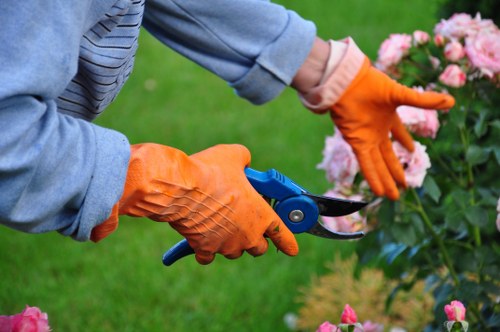
The Role of a Gardener
A gardener plays a pivotal role in maintaining and enhancing outdoor spaces. Whether it's a residential backyard or a large public park, gardeners ensure that plants thrive and landscapes remain beautiful.
They are responsible for a variety of tasks, including planting, pruning, and watering. Additionally, gardeners often design garden layouts that are both aesthetically pleasing and functional.
With knowledge of different plant species and their specific needs, gardeners can create environments that promote healthy growth and sustainability.
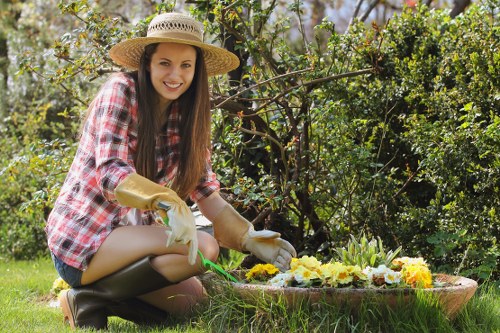
Essential Gardening Services
Gardening services encompass a wide range of activities tailored to maintain and improve outdoor spaces. These services include:
- **Lawn Care**: Regular mowing, edging, and fertilizing to keep lawns healthy and vibrant.
- **Planting and Landscaping**: Selecting and arranging plants to create visually appealing designs.
- **Pruning and Trimming**: Shaping plants and trees to promote healthy growth and remove dead or diseased parts.
- **Irrigation Management**: Installing and maintaining watering systems to ensure plants receive adequate moisture.
- **Weed Control**: Removing unwanted plants that compete with desirable vegetation.
These services not only enhance the beauty of a space but also contribute to its ecological health.
Professional gardeners tailor their services to meet the unique needs of each client, ensuring personalized care and attention.
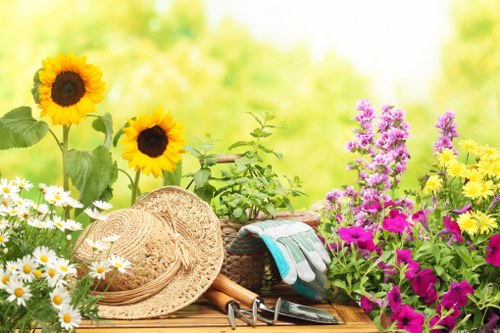
Benefits of Hiring a Professional Gardener
Engaging a professional gardener offers numerous advantages:
- Expertise: Trained in horticulture, gardeners possess the knowledge to cultivate a variety of plants effectively.
- Time-Saving: Managing a garden requires time and effort that many individuals may not have.
- Cost-Effective: Preventing plant diseases and optimizing growth can save money in the long run.
- Customized Care: Services are tailored to the specific needs of your garden.
- Increased Property Value: A well-maintained garden enhances the overall appeal and value of a property.
These benefits make hiring a gardener a wise investment for maintaining beautiful and healthy outdoor spaces.
Moreover, professional gardeners stay updated with the latest gardening techniques and trends, ensuring your garden remains contemporary and thriving.
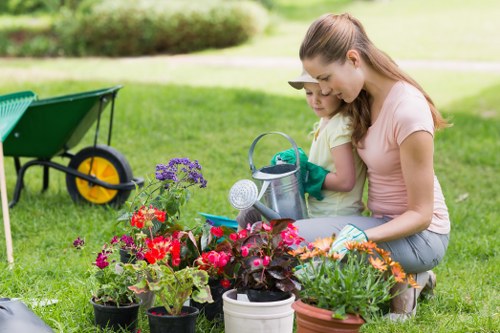
Choosing the Right Gardening Service
Selecting the appropriate gardening service involves several considerations:
- Experience: Look for gardeners with a proven track record and extensive experience.
- Qualifications: Ensure the gardener has relevant certifications or training.
- Service Offerings: Choose services that align with your specific gardening needs.
- Reputation: Check reviews and ask for references to gauge reliability and quality.
- Cost: Compare pricing to ensure it fits within your budget without compromising quality.
Taking the time to evaluate these factors will help you find a gardener who can deliver exceptional results.
Additionally, clear communication with your gardening service ensures that your expectations are met and any issues are promptly addressed.
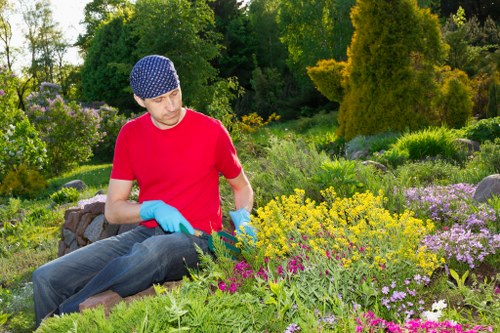
Maintaining Your Garden Between Visits
While professional gardeners provide invaluable services, maintaining your garden in between visits is essential. Here are some tips:
- Regular Watering: Ensure plants receive adequate water, especially during dry periods.
- Weed Removal: Keep the garden free of weeds to reduce competition for nutrients.
- Monitor Plant Health: Look out for signs of pests or diseases and address them promptly.
- Seasonal Pruning: Trim plants as needed to maintain their shape and encourage growth.
- Soil Care: Fertilize and amend the soil to support plant health.
Implementing these practices can extend the lifespan and beauty of your garden.
Moreover, staying involved in garden maintenance fosters a deeper connection with your outdoor space, making it even more rewarding.
Modern Tools and Techniques in Gardening
The field of gardening has evolved with the introduction of modern tools and techniques. Innovations such as automated irrigation systems, eco-friendly fertilizers, and advanced pruning tools have revolutionized the way gardens are maintained.
These advancements not only improve efficiency but also promote sustainable gardening practices, reducing the environmental impact.
Professional gardeners stay abreast of these developments, integrating them into their services to provide the best care for your garden.
Innovative Irrigation Solutions
Efficient watering is crucial for garden health. Drip irrigation systems and smart controllers ensure plants receive the right amount of moisture without wastage.
Sustainable Gardening Practices
Emphasizing sustainability, gardeners use organic fertilizers and pest control methods to maintain ecological balance.
These practices contribute to a healthier environment and promote the longevity of your garden.
Incorporating such techniques enhances the overall quality and resilience of your outdoor spaces.
Seasonal Gardening Tips
Gardening requires adapting to the changing seasons. Each season presents unique challenges and opportunities:
Spring
Spring is the time for planting and preparing the garden for the growing season. It's essential to start with soil preparation and selecting the right plants.
Summer
During summer, focus on watering, weeding, and protecting plants from heat stress. Mulching can help retain soil moisture.
Autumn
Autumn involves harvesting and preparing the garden for winter. Planting hardy species and cleaning up debris are crucial tasks.
Winter
In winter, maintenance is minimal. Protecting plants from frost and planning for the next gardening season are key activities.
Adapting to Climate Change
With changing climate patterns, gardeners must be adaptable. Selecting resilient plant varieties and implementing water-efficient practices are essential.
Urban Gardening
Urban gardening is gaining popularity, allowing city dwellers to cultivate plants in limited spaces. Techniques like container gardening and vertical gardening are commonly used.
These methods make gardening accessible and manageable in urban environments.
The Importance of Soil Health
Soil health is fundamental to successful gardening. Healthy soil provides essential nutrients, supports plant growth, and fosters beneficial microorganisms.
Gardeners focus on improving soil structure through composting, adding organic matter, and practicing crop rotation.
Regular soil testing helps determine nutrient levels and pH balance, guiding appropriate amendments.
Composting and Organic Matter
Composting transforms kitchen and garden waste into nutrient-rich soil additives. Incorporating compost enhances soil fertility and promotes sustainable gardening.
pH Balancing
Maintaining the correct soil pH ensures optimal nutrient availability for plants. Adjusting pH levels can prevent nutrient deficiencies.
Mulching Techniques
Mulching conserves moisture, suppresses weeds, and regulates soil temperature. Organic mulches like bark or straw are commonly used.
Effective mulching contributes to a healthier and more productive garden.
Eco-Friendly Gardening Practices
Eco-friendly gardening minimizes environmental impact while promoting sustainability. Key practices include:
- Water Conservation: Utilizing rainwater harvesting and efficient irrigation systems.
- Organic Gardening: Avoiding synthetic chemicals and using natural fertilizers.
- Biodiversity: Planting a variety of species to support wildlife and enhance resilience.
- Composting: Recycling organic waste to enrich soil.
- Energy-Efficient Tools: Using manual or electric tools instead of gas-powered ones.
Adopting these practices fosters a harmonious relationship with nature.
Additionally, eco-friendly gardening contributes to the health of the ecosystem, benefiting both the gardener and the environment.
Rain Gardens
Rain gardens are designed to absorb and manage stormwater runoff. They reduce erosion and improve water quality by filtering pollutants.
Native Plant Selection
Choosing native plants supports local ecosystems, requiring less maintenance and providing habitat for native wildlife.
Integrated Pest Management
Integrated Pest Management (IPM) combines biological, cultural, and chemical methods to control pests sustainably.
IPM minimizes reliance on harmful pesticides, promoting a healthier garden environment.
Enhancing Garden Aesthetics
Aesthetics play a significant role in the appeal of a garden. Gardeners employ various techniques to enhance beauty:
- Color Coordination: Selecting plants with complementary colors for a visually pleasing palette.
- Texture Variety: Incorporating plants with different leaf shapes and textures adds depth and interest.
- Focal Points: Creating areas of interest, such as water features or sculptures.
- Pathways and Structures: Designing walkways and installing garden structures for functionality and style.
- Lighting: Using garden lighting to highlight features and extend usability into the evening.
These elements combine to create a harmonious and inviting outdoor space.
Thoughtful design and attention to detail make a garden not just beautiful but also a personal sanctuary.
Water Features
Incorporating water features like fountains or ponds adds a sense of tranquility and can attract wildlife to your garden.
Garden Lighting
Strategic lighting enhances the ambiance and safety of the garden, allowing enjoyment during nighttime.
Outdoor Seating Areas
Creating comfortable seating areas encourages relaxation and enjoyment of the garden atmosphere.
These features make the garden a versatile space for both aesthetics and functionality.
Gardening Tools and Equipment
Having the right tools is essential for effective gardening. Common tools include:
- Pruning Shears: For trimming and shaping plants.
- Shovels and Spades: For digging and moving soil.
- Rakes: For leveling soil and removing debris.
- Hoses and Sprinklers: For watering plants efficiently.
- Wheelbarrows: For transporting materials around the garden.
Quality tools can make gardening tasks easier and more enjoyable.
Investing in durable and ergonomic tools ensures longevity and reduces the risk of injury.
Electric vs. Gas-Powered Tools
Electric tools are typically quieter and more environmentally friendly, while gas-powered tools offer greater power for heavy-duty tasks.
Tool Maintenance
Regular maintenance, such as cleaning and sharpening tools, extends their lifespan and ensures optimal performance.
Storage Solutions
Proper storage, like tool sheds or garages, keeps tools organized and protects them from the elements.
Effective tool management contributes to a more efficient and pleasant gardening experience.
Conclusion
Hiring a professional gardener for your gardening services can transform your outdoor space into a thriving, beautiful haven. From expert plant care to innovative design and eco-friendly practices, gardeners provide invaluable services that enhance both the aesthetic and functional aspects of your garden.
Whether you’re looking to maintain a lush lawn, design a vibrant flowerbed, or implement sustainable gardening techniques, a skilled gardener can help you achieve your vision.
Don’t wait to elevate your garden—contact us today to book your service and embark on the journey to a stunning outdoor sanctuary.